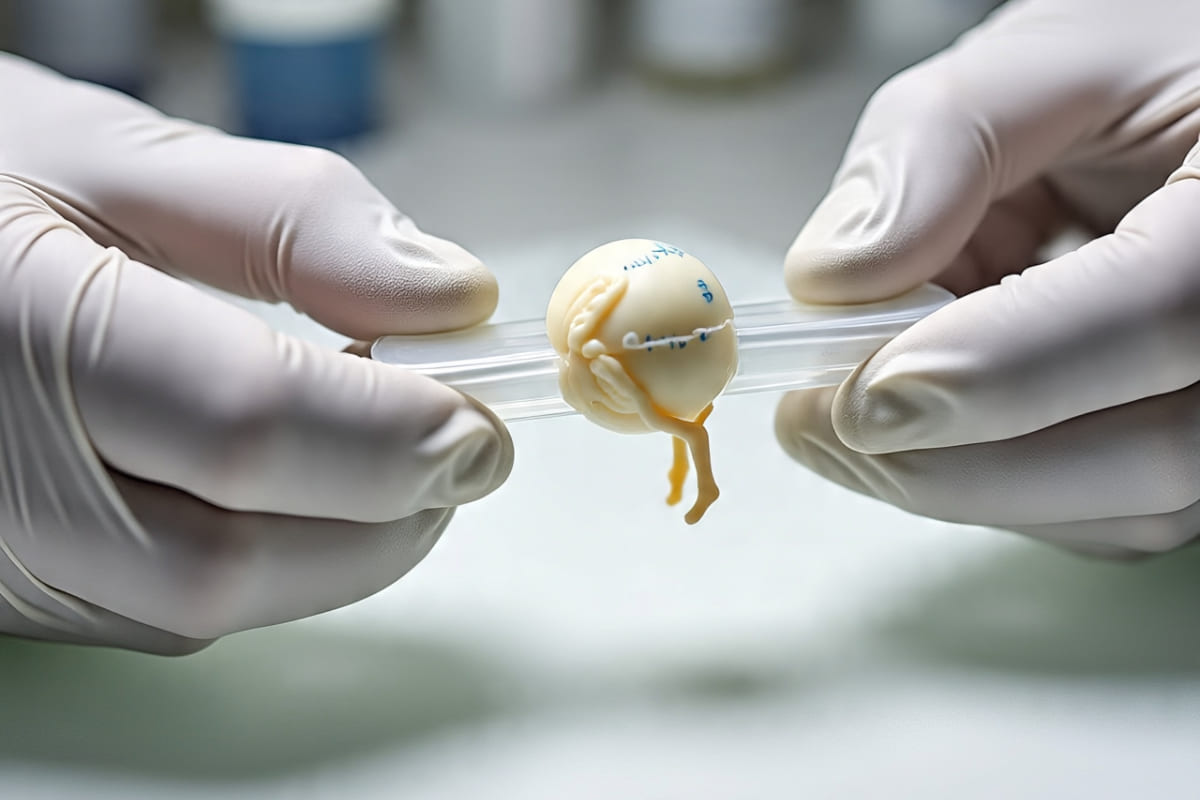Let’s discuss egg freezing, a topic that isn’t discussed enough. Not during dinner. Not in chat rooms for family groups. Perhaps mentioned in whispers during brunch, but even then, it’s typically met with a nervous laugh or half-baked myths.
However, more women are considering it. Health and Career. awaiting the ideal companion. Or perhaps you simply need some breathing space. No matter the reason, the issue of freezing my eggs comes into play.
It’s a very personal decision that is frequently complicated by biology, finances, emotions, and occasionally pressure, whether self-inflicted or not. Therefore, this is for you if you’re sitting there contemplating if freezing eggs makes sense to you or not.
Without using clinical language or sugarcoating, let’s go right to the point. Just honest conversation.
How Does Egg Freezing Work?

To put it simply, oocyte cryopreservation, or egg freezing, is a method of maintaining your fertility.
When you’re ready to try for a child, doctors will take your eggs, freeze them, and keep them for later. It’s similar to, at least in part, stopping your biological clock You’re not freezing time, but you are freezing potential.
This is the preliminary sketch:
- The activation of hormones (hey, daily injections).
- Egg retrieval, a brief operation performed under little anesthesia.
- Freezing the mature eggs by vitrification, a flash-freezing method.
- Safely storing them till you need them in a lab.
The objective? should harvest as many good eggs as you can while you’re still young because, whether you like it or not, both the amount and quality of eggs decrease with age.
Why would someone put their eggs in the freezer?
To be honest, there are a dozen reasons, and none of them require justification. Here are some of the more significant ones:
1. You’re not yet ready.
Perhaps your career is your primary concern. are still getting to know yourself. Or perhaps your ovulation schedule simply hasn’t coincided with love. That is true.
2. You Have Health Concerns
Fertility can be harmed by cancer therapies like chemotherapy. As a precaution, some women freeze eggs in advance. As a precaution, some people with autoimmune diseases or endometriosis do it.
3. Early Menopause in the Family History
Egg freezing may be a preventative step to protect your possibilities if early menopause runs in your family.
4. You Desire Greater Authority
This one is enormous. Planning every aspect of your life is not the goal. It’s about being able to choose whether and when to have children.
The Method: Expectations (and Things Nobody Tells You)
If you choose to proceed, fasten your seatbelt. It isn’t a spa service.
First Step: Consultation
To determine hormone levels and the number of eggs you may have (referred to as your ovarian reserve), you will first have blood tests and an ultrasound. The Anti-Müllerian Hormone (AMH) test is one crucial test. A fertility expert will meet with you. In addition to answering your 40,000 questions, they will discuss options, schedules, and expenses.
Step 2: Injections of Hormones
This phase lasts roughly eight to twelve days. In order to encourage your ovaries to generate more eggs than normal, you will inject yourself every day. Imagine producing an entire batch at once rather than just one egg every cycle.
Adverse effects? Yes, bloating, breast pain, mood swings, and exhaustion. You’ll feel like a hormonal balloon, really.
Step 3: Observation
To monitor the growth of your follicles, you will have multiple early-morning appointments for ultrasounds and bloodwork. For around two weeks, be prepared to reorganize your life.
Step 4: Recovery of Eggs
You will receive a trigger shot (time is everything) when your eggs are ready. Thirty-six hours later, Sedation is part of a brief outpatient procedure to remove the eggs.
Don’t cut. No sutures. However, you may experience tenderness or cramping afterwards. Depending on the situation, most people return to work the following day.
Step 5: The Freeze
In a fertility lab, your mature eggs are vitrified and kept in liquid nitrogen. That’s all. Until you choose to defrost them, fertilize them (using IVF), and try to conceive, they will remain frozen.
The Real Talk: The Price
Let’s not act as though it’s inexpensive. The cost of freezing eggs usually comes out of pocket, and it adds up quickly.
- Starting cycle: roughly $10,000 to $15,000.
- Drugs: between $3,000 and $5,000
- $500 to $1,000 each year for storage; separate (and expensive) future IVF costs
Fertility coverage is currently provided by certain companies, particularly in business and tech environments. Asking HR is worthwhile. (Uncomfortable? Perhaps. but possibly worthwhile.)
Additionally, some women require multiple cycles in order to recover a sufficient amount of eggs. Both monetarily and emotionally, that portion hurts.
How many eggs is the best amount to freeze?
Fertility experts advise freezing 15 to 20 mature eggs if you want a good chance of having a healthy child in the future, however there is no magic number. Why so many? because not all of the eggs thaw. Not all eggs are fertilized. Not all embryos implant. It is a game of numbers. A flawed, annoying one.

One round might be plenty if you’re under 35. Older than that? You may require two. Consult your doctor to make a decision.
When Is It Time to Freeze? Does the “Best” Age Exist?
Although there isn’t a one age that works for everyone, we do know this:
- Fertility begins to decrease at age 30 and then declines more precipitously at age 35.
- Freezing in your late 20s to early 30s increases your chances of having a child, but fewer individuals are considering having children at that age. • Younger eggs are of greater quality.
- In the range of 32 to 36, many freeze. For many women who are just beginning to consider the future, it’s a sweet place.
However, if you’re 37, 38, or 39, there’s still time. Just be aware that your doctor could advise taking action right now.
What Dangers Exist?
Although freezing eggs is thought to be safe, there are risks involved, just like with any medical procedure.
- Ovarian Hyperstimulation Syndrome (OHSS): The ovaries go into overdrive in this uncommon but true disorder. It may result in pain, bloating, and in extreme situations, hospitalization.
- No assurance: Even if you freeze twenty eggs, you won’t have a child. That’s the truth, even though it’s hard to hear. • Emotional fluctuations: Hormones, hope, and waiting can all cause mental turmoil. Support groups or counseling may be beneficial.
Putting your reproductive future in a storage tank also has an emotional cost. Everyone experiences that in a different way.
Is It Going to Work Later?
Freezing an egg does not ensure a child. It provides you a chance, and it’s usually a better one than attempting fresh eggs naturally at 40.
The following factors determine success:
- At freezing, your age (younger is better)
- The number of mature eggs that are frozen; • quality of egg
- The fertility lab’s proficiency
Approximately one live child is born from every three frozen eggs. Although it may seem low, keep in mind that most women freeze several eggs. It’s not a guarantee, though. It’s conceivable.
Do You Think It’s Right?
That is the crucial question. It’s about your gut, not just biology or timing.
Consider this:
- Do I desire kids in the future, but not now?
- Do I accept the emotional and financial costs?
- Would I feel less stressed or more at ease if I frozen my eggs?
- Do I feel empowered or under pressure to do this?
Some women feel empowered when they freeze eggs.Others believe it’s just another method for society to tell them to hurry up. Both emotions are legitimate. It’s your body. Your future. It’s your call.
Conclusion: This Is Your Schedule
Freezing eggs isn’t always the best option. It’s not a surefire approach that’s always effective. However, it gives many women a choice that they did not have previously. Freezing your eggs can feel like buying yourself a little wiggle room if you’re unsure of what your work, romantic life, or health will look like in five years. It’s not for everyone, though. And that’s also OK. This is a very personal choice. If you’re thinking about it, research it. Consult a fertility expert. Pose awkward queries. Above all, pay attention to your intuition.
You deserve choices, regardless of whether you choose to preserve your eggs or not.
FAQs
Freezing eggs involves retrieving mature eggs from the ovaries and storing them at sub-zero temperatures. Freezing eggs allows you to preserve fertility for future use, often with the help of IVF later on.
Women in their late 20s to mid-30s often benefit the most. Women who are not ready for children due to career, health, or personal reasons may also find egg freezing empowering. In short, it’s about having options.
Age plays a big role. Age determines egg quality and quantity, both of which affect success rates when using frozen eggs later. The younger the eggs, the better the odds.
Technically, eggs can be stored for many years. Technically, most clinics recommend using them within 10 years, but there’s no fixed expiration if they remain properly frozen.
The process involves hormone injections and a short procedure. The process may cause mild discomfort, bloating, or mood swings. However, serious risks are rare when done by experienced specialists.



1 Comment
Keep going, you are doing great work